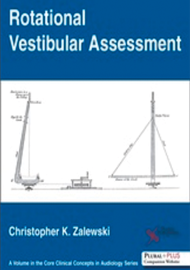Although Rotational Vestibular Assessment is a textbook aimed primarily at audiologists, all specialists involved in vestibular work, including medics, physiotherapists and scientists will find something of interest here. The writing style adopted, combined with the numerous illustrations, all help to make what can be complex concepts readily accessible.
The book opens with a chapter on the history of human rotation, in keeping with the author’s personal interests in the historical perspectives of medicine, providing interesting background and extending the references from 1794 to 2017! The next three chapters provide a good overview of the anatomy and physiology of peripheral and central vestibular systems, including detailed descriptions of the velocity storage mechanism. Along with normal function, the effects of vestibular failure are discussed with particular reference to the processes underpinning static and dynamic compensation.
The remainder of the book is concerned with the clinical application of rotational chair testing, although reference is made to interrelationships with other test outcomes such as the caloric. Although some time is spent on general considerations for rotation chair instrumentation and patient preparation, the main focus is on sinusoidal harmonic acceleration and velocity step testing.
Each test modality has its own chapter covering stimulus properties and parameters, data interpretation, normal physiological responses, the effects of peripheral and central vestibular pathology and a summary of test strengths and limitations. Descriptions are detailed and supported by the extensive use of tables, diagrams and sample data, making this a particularly useful reference. The book concludes with a chapter on supplemental rotational tests, including VOR suppression, visual-vestibular enhancement and more specialist tests such as eccentric rotational testing for otolith function.
Overall, this book provides an excellent and accessible overview of rotational testing, with content that will find broader appeal to those involved in vestibular science, clinical testing and vestibular rehabilitation.




